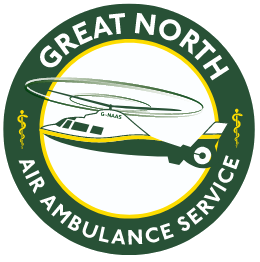Major trauma patients across the region will benefit from yet another life-saving medical approach, as the Great North Air Ambulance Service (GNAAS) today begins to carry defrosted Fresh Frozen Plasma (FFP) on board its aircraft.
The charity already carries red blood cells on board, enabling their specially trained medics to give blood transfusions to patients with life-threatening bleeding either on board, or at the roadside.
This revolutionary approach recently celebrated its first anniversary in service when representatives from the organisations involved met patients who are alive today because of the rapid blood transfusions they were given at the scene of their accident.
GNAAS teamed up with Newcastle Hospitals and the blood bikes charities in Northumbria and Cumbria and the Henry Surtees Foundation to make that project possible.
Now the team has taken it one step further by carrying plasma, which provides vital clotting components to help blood clots to form and to stop bleeding.
GNAAS is one of the very first air ambulance charities in the UK to carry plasma onboard, which when given together with the blood, is thought will offer patients an even better chance of survival.
Dr Rachel Hawes, the consultant in anaesthesia and pre-hospital emergency medicine at Newcastle’s Royal Victoria Infirmary (RVI) and GNAAS aircrew doctor who brought ‘blood on board’ to the North of England, this afternoon explained the importance of this new development.
She said: “The transfusions we currently give are purely O negative red blood cells. It replaces lost blood and ensures that the oxygen carried by the new blood gets to all the major organs, buying us as much time as possible whilst we stabilise and transfer the patient to the nearest Major Trauma Centre.”
Dr Hawes – also an army reservist with 201 Field Hospital added: “Blood on board has allowed us to greatly improve outcomes for our trauma patients. Yet scientific studies suggest that up to 30% of trauma patients with severe bleeding are no longer able to form blood clots normally by the time they arrive in the Emergency Department (ED), and in fact our own research confirms this to be the case in our region. This means that when the patients arrive in ED, they are in a condition known as coagulopathy – they haven’t been able to produce enough of their own blood clots to keep up with the bleeding and so the bleeding spirals out of control.
“By giving a more balanced transfusion, using equal volumes of red blood cells and plasma, we hope to prevent this happening to our critically ill patients, ultimately helping to save their lives.”
A three month trial begins today (May 24) using the same cool boxes which were kindly donated by the Henry Surtees Foundation, which also provided blood warmers and two 4×4 vehicles to support the Blood Bikes with their transportation during poor weather.
The logistics will work exactly the same as in the blood on board project. Each day a member from both the Northumbria Blood Bikes and Blood Bikes Cumbria will collect a cool box from the RVI’s Blood Laboratories, transporting it to the two GNAAS airfields – Durham Tees Valley Airport and Langwathby, near Penrith.
Now the cool box will contain two units of blood and two units of plasma. The cool boxes keep their content cool for up to 48 hours and so if not used, they are returned to the RVI to be used during surgery and other procedures in the hospital.
Dr Hawes adds: “To carry out a regional programme of this scale, across one of the most challenging geographical areas in the UK, takes great dedication and strong collaborative working. Blood, and now pre-hospital plasma on board the GNAAS aircraft, simply wouldn’t be feasible without the strength of our partnerships and without the support of the public, whose donations make it all possible.
“We are delighted to be in a position to provide the most up to date, clinical techniques.”



